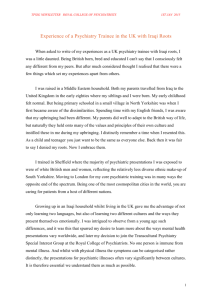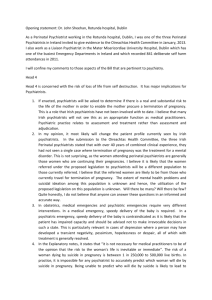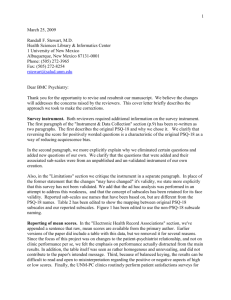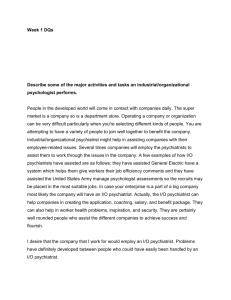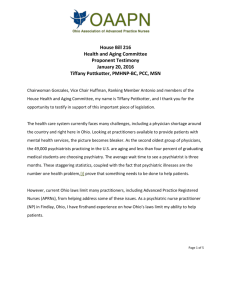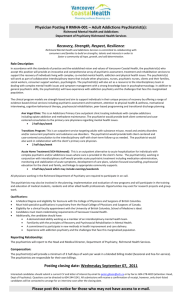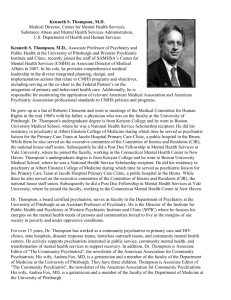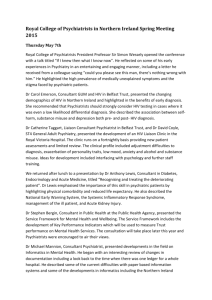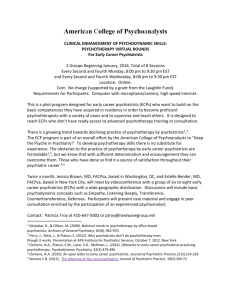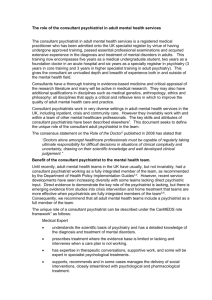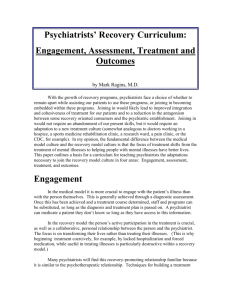Opening Statement to the Hearings of the Joint Committee on Health
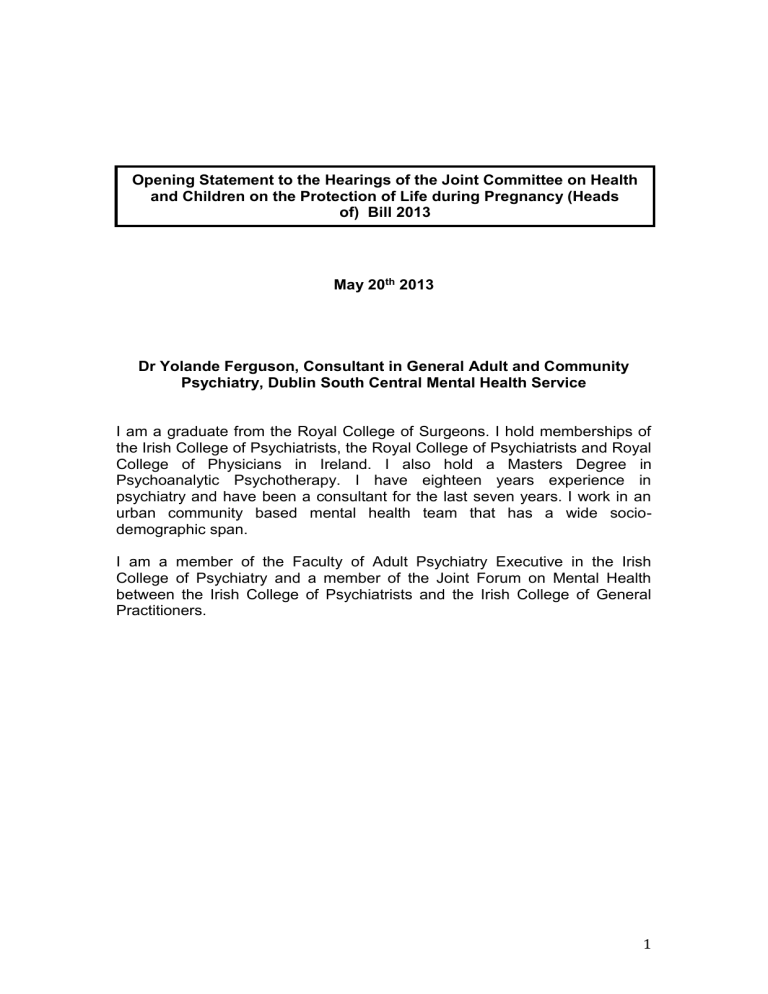
Opening Statement to the Hearings of the Joint Committee on Health and Children on the Protection of Life during Pregnancy (Heads of) Bill 2013
May 20 th 2013
Dr Yolande Ferguson, Consultant in General Adult and Community
Psychiatry, Dublin South Central Mental Health Service
I am a graduate from the Royal College of Surgeons. I hold memberships of the Irish College of Psychiatrists, the Royal College of Psychiatrists and Royal
College of Physicians in Ireland. I also hold a Masters Degree in
Psychoanalytic Psychotherapy. I have eighteen years experience in psychiatry and have been a consultant for the last seven years. I work in an urban community based mental health team that has a wide sociodemographic span.
I am a member of the Faculty of Adult Psychiatry Executive in the Irish
College of Psychiatry and a member of the Joint Forum on Mental Health between the Irish College of Psychiatrists and the Irish College of General
Practitioners.
1
I thank the Committee for this opportunity and welcome this legislation.
Psychiatrists are unique among medical practitioners in that we deal with legislation as part of our routine clinical practice in the form of the Mental
Health Act 2001. We have extensive experience in performing assessments to ascertain whether our patients meet the legal criteria set down in that act.
We also routinely defend those decisions in Mental Health Tribunals. We will bring that expertise and experience to the enactment of this legislation.
I will restrict my statement to Heads 4, 6 and 8.
I believe the constitution of the assessment group in Heads 4 and 8 requires revision.
These Heads addresses an infrequent circumstance. For the most part this represents a woman/child in the early stages of pregnancy who is distressed because she is pregnant and generally does not have a mental illness. They are most likely to present to their general practitioner in the first instance. If the doctor dealing with them is sufficiently concerned they then make a referral to the appropriate local psychiatric service. Psychiatric services in
Ireland, like most other countries, are arranged on a geographical basis with community mental health teams addressing the needs of the local community.
There are also specialist teams who provide for the needs of children and those with intellectual disability. The Psychiatrists who are the clinical leads for these teams are expert in assessing suicidal risk, whatever the circumstance. The General Practitioner has been assigned a peripheral role in this legislation. They should have a central role, as they do with the 2001
Mental Health Act. Only one psychiatrist which would not differentiate psychiatry from other medical specialties in this Legislation.
The assessment group in both Heads is made up of an obstetrician and two psychiatrists. Firstly there is a requirement that both psychiatrists are attached to an institution registered with the Mental Health Commission. This does not reflect psychiatric practice. Child and Adolescent Psychiatrists are rarely attached to such an institution. Some General Adult Psychiatrists who provide community based care are also not attached to an institution as their organisation separates those roles. I suggest that this be replaced by ‘a
Psychiatrist who is entered on the Specialist Register with the Medical
Council’. The Head also states that one psychiatrist must be attached to an obstetric unit. The Head and the explanatory note contradict one another in that the Head states attached to
‘an appropriate place’ and the note to ‘ the appropriate place’. While clarification is required as to whether the Head specifically demands that the psychiatrist must be attached to the unit in which the procedure would take place, I recommend this requirement be removed. These are women/children who cannot contemplate reaching the point of the booking appointment for an obstetric unit that is the usual entry to perinatal psychiatry. This requirement imposes an unnecessary restriction.
Their needs can be accurately assessed by an appropriate specialist, such as a General Adult or Child and Adolescent Psychiatrist. I echo my colleagues’ proposals that a Panel be established by the Executive much as the Mental
2
Health Commission form a Panel for the workings of the Mental Health Act.
Ideally the psychiatrist who is involved in their care would be on the Panel to provide the psychiatric opinion. I should add that an Obstetrician should not be expected to perform assessments out of their area of expertise. It is also proposed that a consensus must be reached between all three doctors. Could the Obstetrician be placed in a position that they could veto the assessment of two psychiatrists on the assessment of risk of suicide?
As the Head is currently written the woman/child will in fact have seen four doctors including her general practitioner at the end of the assessment process. If the case proceeds to an appeal she will have been seen by a total of seven doctors.
Finally the time period for the appeal process set out in Heads 6 and 8 should be shortened to 72 hours for each stage of the appeal.
In conclusion this legislation must serve to serve to alleviate rather than add to the distress of the women and children for whose needs it seeks to address.
Thank you.
Dr Yolande Ferguson
MB MRCPsych MRCPI MSc
Consultant Psychiatrist
IMC: 16477
Dublin South Central Mental Health Service
3

